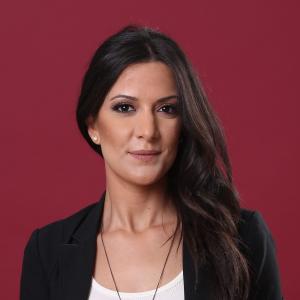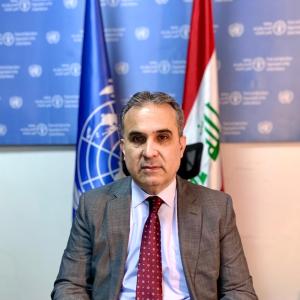FAO Iraq Takes Strides Towards Preserving Agricultural Biodiversity and Conservation of Plant Genetic Material in Iraq
19 May 2024
Baghdad, Iraq - May 19, 2024
The Food and Agriculture Organization of the United Nations (FAO) in Iraq, in collaboration with the International Center for Agricultural Research in the Dry Areas (ICARDA), is making strides towards preserving agricultural biodiversity and conservation of plant genetic material in Iraq through the Gene Bank (Seed Bank) component. This initiative is a component of the FAO- European Union (EU) funded project titled "Restoration and Strengthening the Resilience of Agri-Food Systems."

The Seed Bank component of this project holds paramount importance as it addresses the challenges faced by Iraq's agricultural sector due to the of challenges that the country has experienced. The main objectives are the rehabilitation of the Abu Gharib seed bank in Baghdad, which has been operational since 1977 but has suffered from infrastructural damage. Additionally, the project aims to establish a new seed bank in the Kurdistan Region of Iraq in Sulaymaniyah Governorate.
This week, a team of experts from FAO and ICARDA conducted field visits and held meetings with Iraqi officials to advance these efforts.
In Baghdad, the experts team inspected the gene bank infrastructure and research station, emphasizing the meticulous assessment of equipment and staff capacity. Subsequently, fruitful meetings were held with senior officials at the Ministry of Agriculture, focusing on the current status, challenges, opportunities and the importance of the gene bank rehabilitation.
FAO Iraq Representative, Dr. Salah El Hajj Hassan affirmed: "The restoration and establishment of gene banks are crucial steps towards safeguarding Iraq's agricultural biodiversity and ensuring food security for future generations. FAO remains committed to working closely with Iraqi authorities and partners to achieve these objectives.” He also acknowledged the cooperation with the Iraqi government and the EU, underscoring the importance of collaborative efforts in advancing agricultural sustainability and resilience.
In Erbil, FAO Iraq and ICARDA teams met with Her Excellency the Minister of Agriculture and Water Resources in the Kurdistan Region of Iraq (KRI), Ms. Begard Talabni, and her team to discuss the construction of the first gene bank in the Kurdistan Region. This meeting marks the beginning of a joint effort to conserve crop plant genetic resources in Iraq.
In this regard, HE the Minister stated: "Our collaboration with FAO signifies a significant milestone in our efforts to strengthen agricultural resilience in Iraq. Establishing seed or gene banks will play a pivotal role in preserving our agricultural heritage and adapting to future challenges."
Continuing their efforts in Sulaymaniyah, FAO Iraq and ICARDA teams engaged with key counterparts to discuss infrastructure, procurements, and site assessments for the gene bank. A site visit at Hawari-Shar Park was conducted to evaluate facilities for smooth implementation.
Two respective working groups have been established to coordinate efforts between local stakeholders and to facilitate a speedy implementation of the project component.
This initiative aligns with several Sustainable Development Goals (SDGs), particularly Goal 2: Zero Hunger and Goal 15: Life on Land, by ensuring the conservation of genetic resources essential for food security and sustainable agriculture.


He started his career in 1984, as Senior Research Assistant in the Agricultural Research and Education Centre (AREC), American University of Beirut. From 1987 to 1991, he was Coordinator of the Student Training Programme, and also Agriculture and Horticultural Teacher for the Faculty of Agriculture, at the Lebanese University.
From 1991 to 1995, he worked as Agricultural Engineer at the Ministry of Agriculture, Bekaa Regional Office, Zahlah and was then assigned to the Agricultural Research Institute in the Tal Amara station, first as Head of the Crop Production Department and subsequently in charge of the Plant Protection Laboratory. From 2002 to 2006, he was Director of the Kfardane Research Station (Agricultural Research Institute). In 2008, he became Visiting Scientist at the International Maize and Wheat Improvement Centre (CIMMYT) and Coordinator of a project with the International Centre for Atomic Energy Agency, Vienna.
In 2010, he served as Advisor to the Minister for Agriculture of Lebanon. In 2011, he became President of the Pesticide Scientific Committee, Head of the Phytoplasma Committee and Director of the Agriculture and Rural Development Programme (ARDP) (EU-funded project). From 2010 to 2013, he represented Lebanon in negotiations with EU, Egypt, Jordan and Iraq. During his career, Mr Hajj Hassan also carried out a number of other functions. He represented the Lebanese Agricultural Research Institute (LARI) in several research programmes with the International Centre for Agricultural Research in the Dry Areas (ICARDA) and the American University of Beirut. He was Coordinator of the Mashreq/Maghreb project with ICARDA, representing Lebanon in the Steering Committee, as well as being the Head of the Sugar-beet Delivery and of the Wheat Delivery Committees. For a number of years, Mr Hajj Hassan worked for the preparation of FAO TCP projects and served as the National Director of a TCP project. He joined FAO in January 2014 as FAO Representative in Yemen. Mr Hajj Hassan succeeds Mr El Zubi as FAO Representative in Iraq.



